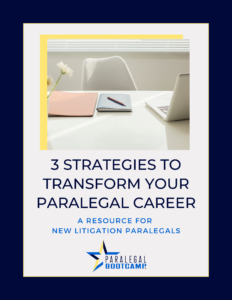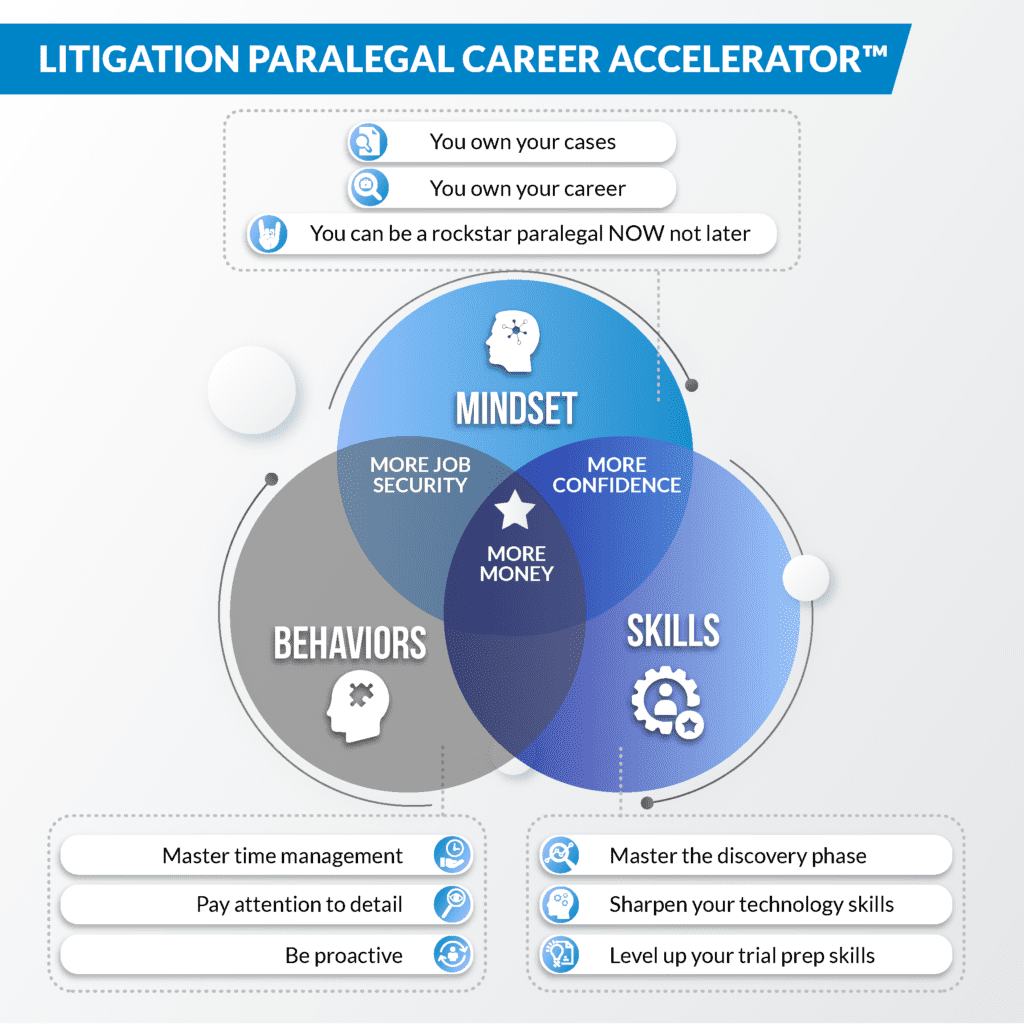These were the top 7 actionable strategies and tips for litigation paralegals to accelerate their paralegal career in 2024.
1. How to Get Up to Speed Fast on Your Cases
I think one of the tips for litigation paralegals that could help here is what I had recommended in our three-step roadmap for new litigation paralegals. Even if you’re not new to the litigation practice area, this would help because it can also be a method that you use to get up to speed fast on any new cases.
You need to get deep into the weeds, but there are three reasons that you do this.
- You’ll be able to manage all of the information.
- In an Excel spreadsheet, you can manage the information to filter the data, sort the data, put the chronology into a timeline, etc.
- You’re adding value to a case by creating a physical resource with key information.

Free Strategy Guidebook for
New Litigation Paralegals
Are you ready to fast-track your litigation paralegal career?!
Our free guidebook reveals three powerful strategies that will set you up for success in your journey. If you’re ready to seize this opportunity and thrive as a litigation paralegal, sign up below, and get started now!
2. What Litigation Software or Applications Should I Try to Learn to Help Me Work in Litigation?
There are two categories to this answer when sharing tips for litigation paralegals on this:
1. What software or applications can you learn now that you have access to and can continually use to keep those skills sharp while you’re trying to find a paralegal position?
2. What will you be expected to know, but you maybe don’t have access to now? Even if you did have access to that software, it might be different than the one that you learned. More importantly, even if you found a free trial or free training on these software products if you don’t put them to use in the real world, then you probably won’t retain much of what you learned.
Check out these 3 Microsoft Excel Tips for Litigation Paralegals.
Learn These 3 Softwares Now
Microsoft Word, Microsoft Excel, and Adobe. I know they’re not sexy or exciting, but those three software tools are the ones that you must have more than just a basic knowledge of as a litigation paralegal.
You’re going to use them regardless of the type of employer that you end up working for, regardless of what practice area you go into in litigation, and what other tools are available.
Those three software tools are ones you will use for your entire paralegal career, no matter where you go and you can get access to all three of them right now.
Take training online, keep using them, and keep advancing your skills.
The Truth About Learning Litigation Technology Tools
For the litigation technology tools that you will use as a litigation paralegal, even if you’ve got some kind of trial access or student access to it now if you’re just playing around in the software and doing some demos and not putting what you’re learning into real-life practice, you’re probably not going to remember most of what you learn because you can’t apply it to anything.
I’ll list them, but I think your time is better spent getting to an advanced level of Microsoft and Adobe applications.
- Westlaw and LexisNexis, are legal information databases, which you probably got student access to while you were in school.
- e-Filing, the application that allows you to electronically file your pleadings, motions, briefs, and other court filings.
Back in the old days, there was no such thing as electronic filing. When something needed to be filed with the clerk of court, we had to get in our car and drive to the clerk’s office or hire a courier to do it for us.
A document management system that organizes the electronic version of everything in the case, like the Microsoft Word documents that you’re drafting, memos, etc. This is very specific to the employer so it wouldn’t be helpful for you to learn any of them.
- eDiscovery software, which is used to process, review, and produce discovery in cases.
This software is also very specific to what the employer uses. One of the eDiscovery tools, Relativity does have free online training, but first, you don’t know if the firm that you’re going to go to work for as a litigation paralegal has Relativity or if they have some other application.
You don’t know if they have a specific trial presentation software either, so it really wouldn’t be a good use of your time to go out and try to learn all of these different case-specific or firm-specific software products when you might have to learn a completely different application.
- Deposition software applications
- Trial Technology. All of these are very specific to the employer type and the practice area.
For example, let’s say you find yourself at a solo practitioner or a very small firm that doesn’t go to trial that often. They might use an app and an iPad at trial compared to another firm that might have a more expensive system designed for their team’s specific needs. That’s why it wouldn’t do you any good to go out and learn those specific litigation software tools, only to find out that the firm doesn’t even use them.
My tip for litigation paralegals – stick to category one and learn everything you possibly can at a very high level in Microsoft Word, Microsoft Excel, and Adobe.
Here is a 3-step plan to accelerate your paralegal career.

3. How to Become the Information Manager
To elaborate on the first tip for litigation paralegals I shared, I want to reiterate how you can become the information manager of your cases. As a litigation paralegal, it’s easy to get sucked into the never-ending cycle of document management or document chasing.
Where is that hot document?
Do you have a copy of that revised contract that’s part of this dispute?
Can you get me a copy of that email so that I can use it as an exhibit to a motion?
That’s where you have to be careful as a litigation paralegal, because you’re more than just a document manager. You are an information manager.
By focusing on managing the information, you’re going to be able to proactively manage your litigation cases. In order to do that, you have to know what’s going on in your cases. This means that you have to review everything that comes in related to the case.
All of the things coming in on a case eventually go through somewhat of a funnel to determine what’s relevant that’s going to prove or disprove the allegations in the complaint.
And only some of it becomes potential evidence for trial. But it all has to come into that funnel. It’s information that’s found in pleadings and motions and discovery responses, deposition testimony, and the documents and data that gets produced. If you only focus on the documents and data, you’re going to be missing half of what’s going on in the case.
So, we’ve essentially got a couple of different categories. We’ve got the pleadings and motions. Now, they don’t become evidence in and of themselves, but when you put them through that information funnel, there could be citations to evidence within those pleadings and motions. There could also be exhibits attached to those motions or the briefs that support them.
Those attachments or exhibits are what could become evidence. That’s the information, along with affidavits and declarations that might be filed in the case.
It’s the same with discovery responses, such as interrogatory answers, responses to requests for admission, and of course, the documents that get produced as part of a request for production of documents.
Too often, all of these things come in throughout the life of a case, and they get filed away. Instead, what if you reviewed everything and extracted the key information and put that information in one place and then filed it away? In doing so, you’re going to know everything that’s happening in the case.
You’re going to know who the key players are, what the key dates are, and what the upcoming deadlines are. You’re going to know what the attorney needs before they need it. That’s what I used to do when I was a litigation paralegal. Now this was back before there was fancy case management software, which was nice to use.
Litigation Paralegal Boot Camp
Are you tired of being the Panic Mode Paralegal who spends your days playing whack-a-mole with last-minute rush projects because you’re waiting for someone to show you what it takes to be great litigation paralegal?
This is the only program of its kind that provides litigation paralegals with all of the tools to master litigation cases from the complaint through the trial, and everything in between.
You will be the Confident Case Strategist faster than you ever imagined possible.

4. As a New Litigation Paralegal, How Do You Know What to Do on Your Cases?
In this tip for litigation paralegals, I want to share with you how you can know what to do for your cases, without waiting to be told what to do by the attorney, especially when attorneys aren’t known to be the best delegators. This is the key to having a successful and rewarding career without having to wait the 10 to 15 years that everybody says it takes to get there.
If you’ve been following us for a while, you know that I’m on a mission to bust that “learning curve” myth.
You don’t have to “put your time” in like it’s a jail sentence.
I developed a framework that I call the Litigation Paralegal Career Accelerator Framework that started as a simple Venn diagram that had three of the main categories.
I wanted to help with mindset behaviors and skills. And then I said:
What are the three most important areas in each of those three categories? And more importantly, what are the three in each of those categories that would have the biggest impact on a paralegal’s career?
This is what I used to develop the Litigation Paralegal Boot Camp.

It’s not like there are only three in each category effort that you ever would need to know, or a total of nine. But what are the three in each category that are critical? If a paralegal wants to change the trajectory of their career and not have to wait a decade or two to enjoy a successful career, what if there was a quicker path? A better path?
What if it didn’t have to take 15 years? What if you could do it in less than half of that time? You can. I absolutely promise you that you can.
Let’s talk about what’s in each of those categories.
1. Mindset
The first is mindset. The three areas within mindset are:
- The mindset that you don’t have to just put in your time. You can be a rockstar paralegal. Right now, not a decade or two from now.
- You own your career, the mindset that this is your career and you get to choose how successful of a career you have.
- The mindset that you own your cases. You are the project manager of your cases, and you’re taking the lead on proactively moving these cases forward.
In other words, you know what the attorney needs before they know they need it.
2. Behaviors
The next is behaviors. The three areas within the behaviors category are:
- Master time management
- Pay attention to detail at a whole new level.
- Be proactive.
3. Skills
Last but not least, the third main category in that Venn diagram is skills, and the three areas inside the skills section are:
- Master the discovery phase of litigation
- Level up your trial prep skills
- Sharpen your technology skills.
That’s the framework to accelerate your career as a litigation paralegal.
Learn more about the Litigation Paralegal Accelerator Framework here.
5. Make Up For a Lack of On-the-Job Training
If you’re not getting the on-the-job training that you thought you would, or you’re not getting any, you have three options.
- Go get the training that you need.
- Keep struggling and wait for someone to find the time to provide you with the training.
- Keep doing what you’re doing.
That’s just the cold hard truth. I hate to say it. And for that third option.
The Downside of Continuing Without Proper Training
Try not to make too many mistakes or ask too many questions.
Or ask as many as you can without being overbearing and hope that the attorney is patient and understanding. But I’ve seen that third option not go so well. Some of us luck out, right? And it works out for us, but a lot of times it doesn’t.
You probably have seen it too. At least if you’re in any of the social media groups for paralegals or LinkedIn groups for paralegals, you’ve probably seen it.
Let me read you a couple of them that I found in a Facebook group.
One wrote, “The lawyers I worked for never trained/taught me or gave me any direction, was upset the way I did things, so I was fired Monday. I’m beyond upset to the point of just giving up in the legal field. I do a dang good job doing it on my own and now this.”
Another one said, “After a brief experience at a law firm after graduation, they gave me no training and everything I did was wrong. I asked questions and asked to be trained, but they wouldn’t help, and said I should know what I’m doing, but I didn’t, so we parted ways.”
There are dozens more that I could read. It’s sad, but I have to get back to the cold hard truth because I’m not here to placate people. Remember, the mission of this blog is to give you actionable strategies and tips for litigation paralegals to fast-track your paralegal career.
Own Your Paralegal Career and Go Get the Training You Need
Assuming you don’t want to choose option two, or worse yet, just throw up your hands and leave the paralegal profession altogether, then your actionable strategy is to go get the training that you need.
This is your responsibility. This is your career. The training doesn’t have to come from the Paralegal Boot Camp. It can come from anywhere.
But you have to go get it. Look, I’d love to blame the attorneys who don’t take the time to train you, even though they knew when they hired you that you had no experience.
I’d also love to blame the senior paralegal down the hall who’s stingy with her knowledge because she has this scarcity mindset and doesn’t really want anyone else but herself to succeed.
Here’s why the scarcity mindset in the paralegal profession isn’t good for anyone.
But I’m not. I can’t blame them. Because for every one of those paralegals down the hall who doesn’t want you to succeed, there’s another paralegal down the hall who really does want you to succeed.
But they have to do their own job. They have deadlines that they’re not going to risk missing just because the two of you set a time to meet so that she could show you how to put together a deposition notebook. And now she doesn’t have the time.
Remember that your attorney, those fellow paralegals, they are not a training company. They’re not in the business of educating. I know they should have a training program if they’re going to hire junior paralegals, but we can’t blame others.
We have to decide. This is what we got ourselves into. Remember what it was that initially motivated you to go get that paralegal certificate?
Go back to that feeling. You were motivated. This is what you really wanted to do now. Are you going to just give up or are you going to sit around blaming people?
Cause we could even blame the schools. I’d love to blame the schools for not having a more comprehensive training program, but I can’t do that either because they can’t show you what it looks like to work in a particular practice area in a particular firm for a particular lawyer. Every one of them is going to be different.
Who do we get to blame? No one. We take the responsibility for it ourselves and decide if we’re going to be cut out to be a paralegal and part of that is being resourceful enough to figure it out and find the training that we need to do a good job.
Find out what your paralegal school may have forgotten to mention.
6. How to Have the Confidence to Speak Up
Have the confidence to speak up when something’s going off the tracks. That’s what I’m talking about.
What I mean by that is when something is happening in a case, in a transaction, on a file, and you know from your experience or from the feedback you’re getting, the training that you’ve received, or your experience that something is going to go wrong, and you just put your head down, try to get the work done, and hope that you can pull through.
It never happens. We always end up finding ourselves where the train has gone off the tracks and now we’re being held responsible for it because we are the paralegal on the case, the file, etc.
Try to Prevent or Point Out Recipes for Mistakes
Let me give you a specific example for litigation since we’re going over tips for litigation paralegals.
Although you could use this for any of your files, your transactions, real estate closings, etc. But let’s say you’re a litigation paralegal and you’ve got a document production coming up.
You are prepared to meet the deadline. You have it all scheduled out on your calendar. You set aside time every day to review the documents to get them produced in time and to do a quality control check before the end.
Then, the attorney keeps adding on more and more documents or asking you to do more and more things for every document, like instead of just reviewing for privilege, you’re going to review and tag hot documents. You’re going to review and find documents that are for a specific deposition coming up.
They’ve increased the scope, but you haven’t increased the time. You still have to complete them by that same deadline.
To do that, you skip past quality control or you rush through it. And we know when we’re rushed, we make mistakes. In the end, mistakes are inevitable.
When the attorney comes upon that mistake, it’s going to be your fault. What are they going to say to you?
Why didn’t you say something?
Why didn’t you tell me that you were overwhelmed and didn’t think you were going to complete this project on time?
Why didn’t you tell me that because of all of the extra tags and things that I was having you do to these documents, that you might not be able to do a good quality control check?
If that’s what they are going to say, then why not speak up ahead of time? Have the confidence to speak up when you’ve got the opportunity.

7. eDiscovery is a Mandatory Skill for Litigation Paralegals
Here is an excerpt from an interview I had with Michael Quartararo, the President of the Association of Certified E-Discovery Specialists (ACEDS):
“It used to be a plus if a litigation paralegal had eDiscovery experience. To me now, it seems like it’s mandatory. How can you be a litigation paralegal and not know your way around eDiscovery? I don’t know a litigation matter that doesn’t involve some electronic document.
Whether it’s a text message, a Word document, a PDF, a spreadsheet, a presentation, etc., two parties are opposed to each other in litigation. There’s an obligation to collect any relevant material and that material is going to be on a computer somewhere or some other device.
You can’t navigate a litigation case without understanding how to properly collect, process, review, and produce electronic information.
You’re not really working in litigation if you don’t know eDiscovery.”
Advice for Litigation Paralegals Who Say Their Small Firm Doesn’t Do eDiscovery
“I’m sure there’s still paper documents involved in litigation. The challenge that arises is when you print something out and then re-scan it. You lose all the metadata, the searchable text, and some of the functionality that we have available.
In the eDiscovery industry, the technology has gotten so advanced that we’re using machine learning and AI and, and tools like those to parse through large volumes of data.
Even if you’re a small firm and you have small matters and a small number of documents, why wouldn’t you want to capture those electronic documents in a way that makes it much more efficient to work with them, search them, categorize them, or even simple things like creating, a witness book for a deposition?
It just makes so much more sense to do it with today’s computers and technology. You can lose too much and there’s a good chance you might. The federal rules talk about producing electronically stored information in a way that is usable and if you’re printing out documents and then just scanning them and turning over images or PDFs, it’s not really usable to the other side, in today’s world anyway.
You can get some pushback from opposing counsel or even perhaps the court, so I would say it’s a waste of time. You’re spending more time doing it.
But I think maybe they are “getting away with it” because the other side is also not pushing back. And that’s maybe the only reason why they’re able to get away with it. Some firms, certainly smaller firms don’t have the internal resources or the training resources, or even the technology in-house and so they’re relying on an outside vendor to do the eDiscovery work.
Regardless, if you’re a paralegal or a case manager, or frankly an attorney for that matter, and you’re responsible for moving a matter forward, you have to know how to manage that vendor. You have to make sure that the vendor is doing the right thing.
But there are really simple tools out there that’ll just hold your documents in a safe, secure place, keep them organized by matter, enable you to do some searching, sorting, filtering, and find things that you need very quickly rather than going to a case room and pulling a box off a shelf, and rifling through it with post-it notes and all that. That’s the world that we used to live in.
It’s just much more efficient today to do it using computers. There are exceptions, but I think there are few and far between.
At the end of the day, as so many people I think like to say in the industry, you’re not doing litigation if you’re not doing eDiscovery. That’s the bottom line.”
Meet the Author

Ann Pearson is the Founder of the Paralegal Boot Camp, and host of the Paralegals on Fire! Podcast Show, and passionate about promoting the paralegal profession.
Ann spent 20 years working as a paralegal manager and a litigation paralegal before opening the Paralegal Boot Camp in 2010.
Ann’s training programs focus on adding immediate value to a paralegal’s career and bridging the gap between what a paralegal learns in school and what they actually do on the job.
Visit the About Us Page to learn more about why Ann started the Paralegal Boot Camp.


























